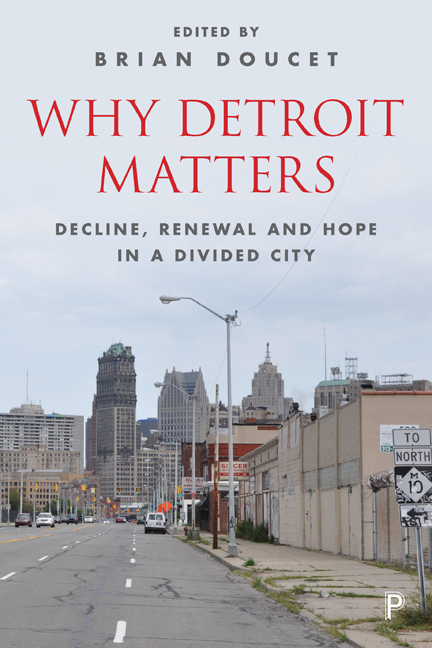Book contents
- Frontmatter
- Contents
- List of contributors
- List of figures and tables
- Acknowledgments
- one Introduction: why Detroit matters
- Section One Lessons from Detroit
- Intermezzo I You may not know my Detroit
- Section Two Practices from Detroit
- Intermezzo II My Detroit
- Section Three Conversations from Detroit
- References
- Index
two - Detroit’s bankruptcy: treating the symptom, not the cause
Published online by Cambridge University Press: 05 April 2022
- Frontmatter
- Contents
- List of contributors
- List of figures and tables
- Acknowledgments
- one Introduction: why Detroit matters
- Section One Lessons from Detroit
- Intermezzo I You may not know my Detroit
- Section Two Practices from Detroit
- Intermezzo II My Detroit
- Section Three Conversations from Detroit
- References
- Index
Summary
We begin with George Galster's examination of the long-term trends in Detroit, how they led to its bankruptcy, and the role of politics, policy, and structural forces in Southeast Michigan. This chapter also provides a detailed contextualization of Detroit's economic, social, and regional geographies, which will be invaluable for understanding many other chapters throughout this book. For Galster, Detroit's decline is not a recent phenomenon; he argues that the structural forces that led to the city's decline were entrenched as far back as the 1950s, when the city began losing population and jobs. In some cases, he even traces the city's decline to its heyday in the 1920s, when auto companies built multi-storey plants in Detroit that would become obsolete as larger suburban factories built on one-level made these older plants uncompetitive. He also argues that in order to understand the City of Detroit's decline, you need to put it into a wider regional context; while the city's population fell, developers constructed thousands of extra homes surplus to the region's needs on its periphery, a trend that continues to this day. Despite posing some insightful solutions, Galster remains pessimistic as to the long-term political feasibility of genuine structural solutions to the city's problems.
George Galster is the Clarence Hilberry Professor of Urban Affairs at the Department of Urban Studies and Planning, Wayne State University. He earned his PhD in Economics from the Massachusetts Institute of Technology (MIT). He has published over 150 scholarly articles and seven books, and is a leading expert on metropolitan housing markets, racial discrimination and segregation, neighborhood dynamics, residential reinvestment, community lending and insurance patterns, and urban poverty. His latest book, Driving Detroit: The Quest for Respect in the Motor City (Galster, 2012), examines the long-term transformations to Detroit's economic, cultural, commercial, and physical landscapes. He is the fifth consecutive generation of George Galster to live in the City of Detroit.
Introduction
In July 2013, the City of Detroit became the largest municipality by far in US history to declare Chapter 9 bankruptcy (Davey, 2013). Although Detroit's leaders and citizenry are now breathing more easily since the city emerged from the bankruptcy courts relatively unscathed in November 2014, a key question remains to be answered.
- Type
- Chapter
- Information
- Why Detroit MattersDecline, Renewal and Hope in a Divided City, pp. 33 - 50Publisher: Bristol University PressPrint publication year: 2017
- 1
- Cited by



